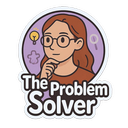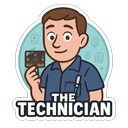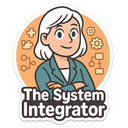thinking with logic
Apply Boolean logic in programming and circuits.
Your Learning Journey
Introducing Boolean Logic and Conditions
Using Logical Operators in Truth Tables
Applying Boolean Logic in Python if Statements
Using Nested if Statements for Layered Conditions
Understanding the Hardware that Implements Boolean Logic
Designing and Testing a Circuit in a Simulator
Low Stakes Knowledge Check
Module introduction
Have you ever wondered how a computer or a game knows how to make a decision? How does a website know if you've entered the right password, or how does a game character know when it has won or lost? It's not magic; it's logic! In this module, we will unlock the secret language that powers all smart technology. This journey will take you from understanding simple true/false questions to being able to confidently write programs that make intelligent choices. By the end of this module, you will have the power to control what your programs do and you'll even understand how these rules are built into the physical circuits of a computer.
Why does this module matter?
Logical thinking is one of the most powerful and fundamental skills in computing. It's the 'brain' behind every app, game, and website you use. Understanding how to build rules and make decisions in code allows you to move from just giving instructions to creating programs that can react, adapt, and respond to the user and the world around them. This is the foundation for creating everything from interactive stories and intelligent chatbots to the complex systems that run our world.
1
For you
This module will help you develop several key computing personas:

The Problem Solver: Logic is the primary tool of the Problem Solver. You will learn how to use conditions and logical operators (like AND, OR, NOT) to build systematic solutions that can handle different situations, making your programs more robust and intelligent.

The Technician: This persona connects the abstract world of code to the real world. You will see how the logical rules you write in your programs are physically built into computer hardware using tiny electronic switches called logic gates, connecting software commands to physical actions.

The System Integrator: This persona focuses on how different parts of a system work together. You'll learn how Boolean logic acts as the 'glue' between the software you write and the hardware that runs it, forming the foundation of all complex computer systems.
2
For your future
The skills you learn in this module are the starting point for many exciting and in-demand careers. One of the most direct pathways is to become a Software Engineer.
Career focus: A Software Engineer is an architect and builder of the digital world. They use their logical and problem-solving skills to design, create, test, and maintain the software applications we use every day, from mobile apps and games to large-scale business systems.
Key Skills: This module is the foundation of a software engineer's toolkit. The ability to use Boolean logic (AND, OR, NOT) and relational operators (>, <, ==) to build complex conditions is how programs make decisions. This skill is essential for writing code that can respond to user input, check for errors, and control the flow of a game or application.
Interesting facts: The term 'software engineering' was popularised by Margaret Hamilton, the lead software engineer for NASA's Apollo space program. Her team's meticulously designed software was critical to the success of the moon landing. Today, software engineering is one of the most in-demand professions, with senior engineers in the UK often earning salaries well over £60,000. They work in almost every industry, from movie production and healthcare to finance and environmental science.
Our Learning Journey
Our journey will begin by exploring the simple power of 'true' and 'false' in the real world. We will then translate this understanding into the world of programming, learning to use Python to write code that can make smart decisions with complex conditions. Finally, we will peek 'inside the machine' to discover how these same logical rules are physically built into the computer's circuits using logic gates, revealing the fundamental link between a line of code and a working electronic system.
Last modified: January 12th, 2026





















